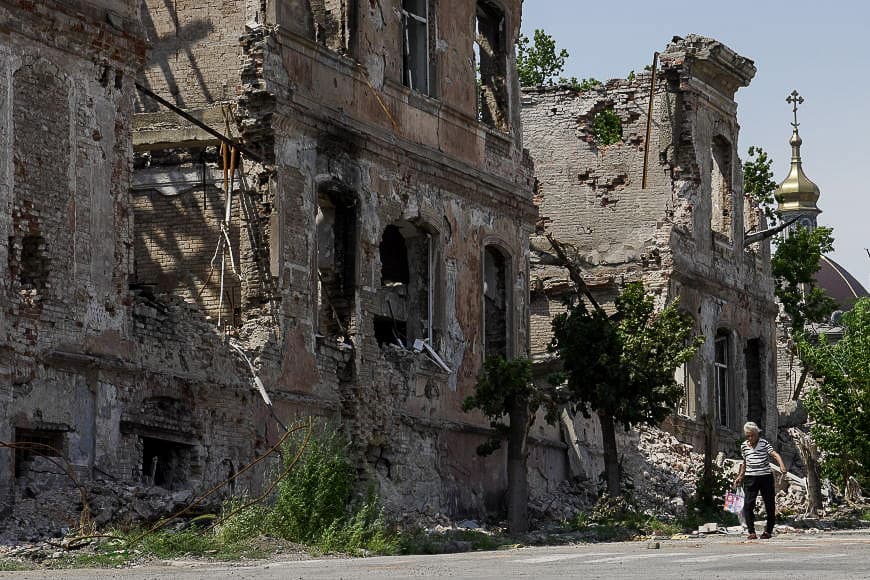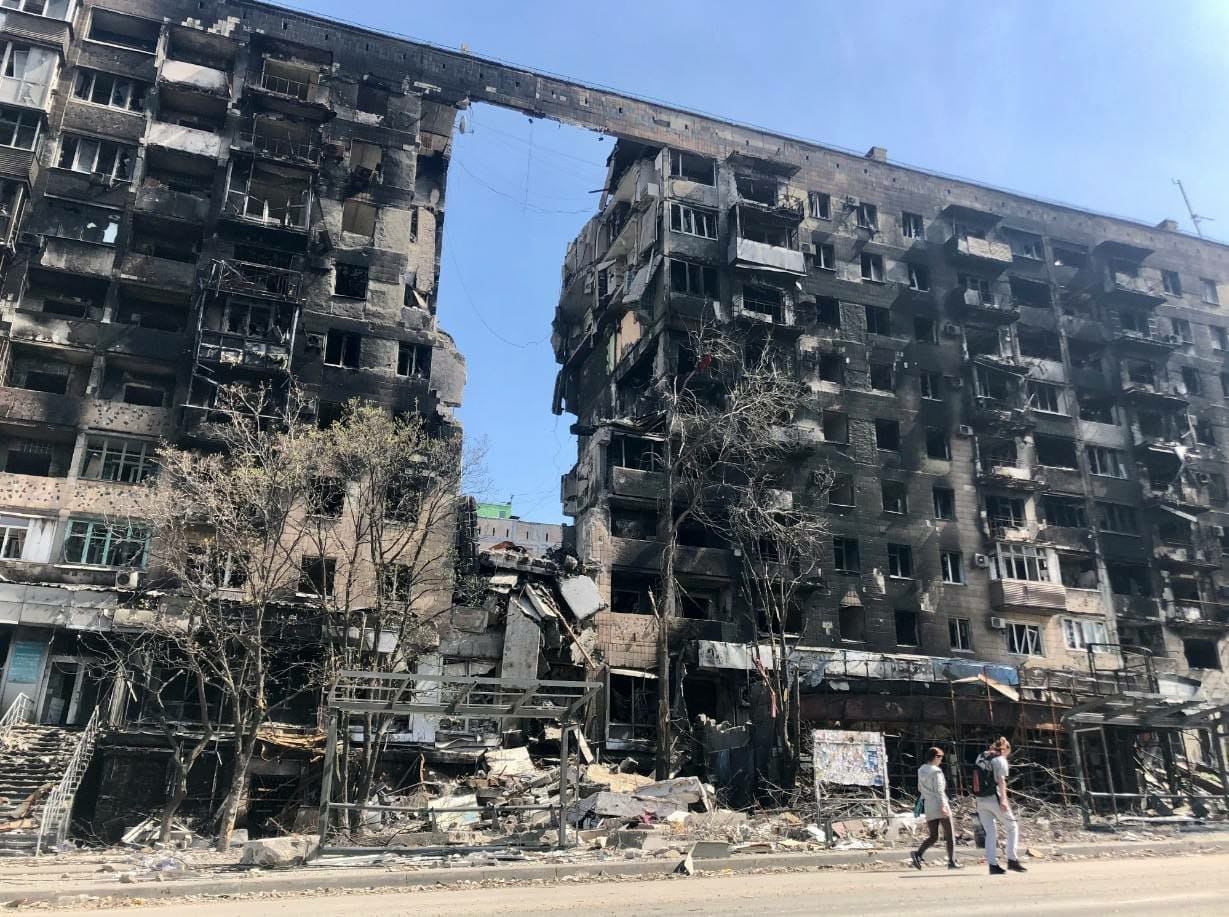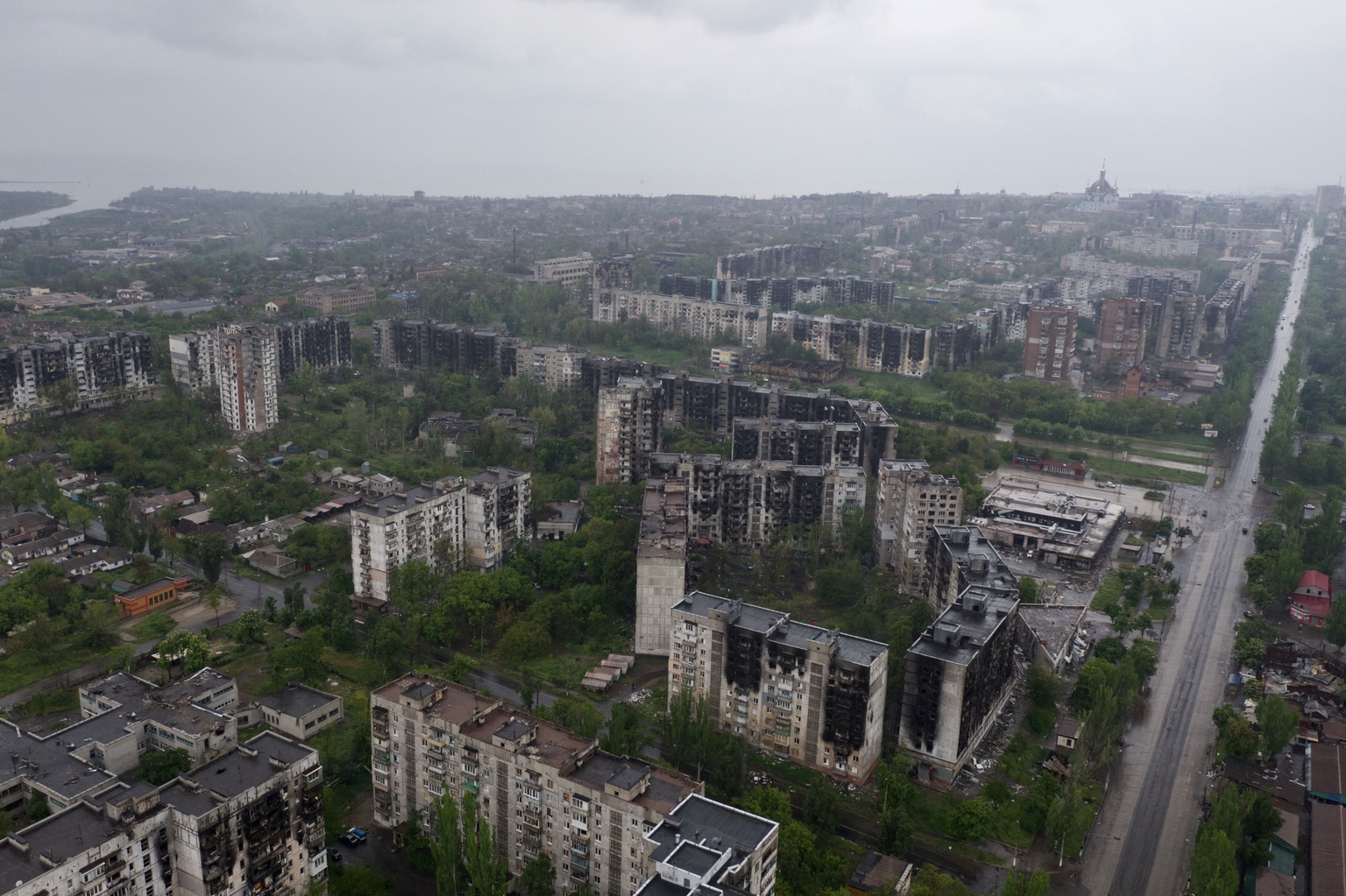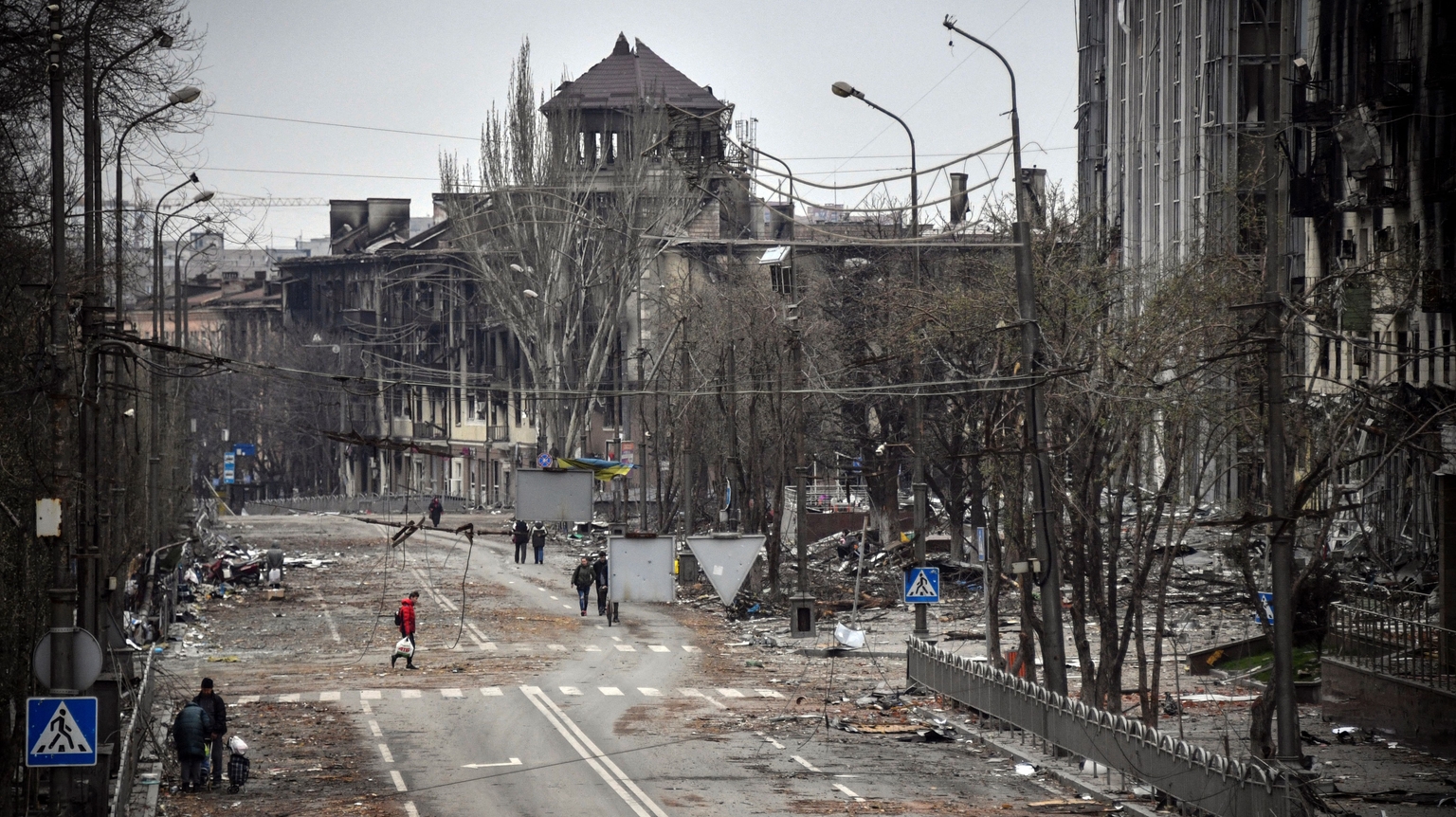Over 100,000 Mariupol residents trapped in dire conditions under Russian occupation

Editor’s Note: The names of some of the people interviewed by the Kyiv Independent for this story have been changed to protect their identity as they have shared sensitive information that could place them and their families in danger.
Three months after Russia’s brutal months-long siege of Mariupol came to an end, life hangs by a thread for those who stayed behind.
Russian airstrikes and artillery pounded Mariupol, reducing what was once a vibrant port city into a landscape of rubble. More than 20,000 people are believed to have been killed in Russia’s siege but the real number could be much higher, according to the Mariupol City Council.
There are mass graves with unidentified bodies outside of the city. Though incessant shelling ceased after the last Ukrainian stronghold in Mariupol fell to Russia in mid-May, those who survived the siege are facing new challenges amid a shortage of everyday necessities such as food and clean water.
Living conditions are dire. On average, some 25 people are dying each day in the occupied city, Petro Andriushchenko, an advisor to the mayor of Mariupol, told the Kyiv Independent.
Andriushchenko said the city council could not establish one particular cause of death that the population is most vulnerable to because “everything is difficult.” Only about 40% of the remaining residents have access to electricity and running water, and a majority are still cut off from gas even as winter approaches, according to the official.
Most people have come to rely on humanitarian aid that Russian occupiers are handing out to get through each day, but it is nowhere near enough, the official said. It is also unclear how long they will continue handing it out.
Infectious diseases are also spreading. Russia’s indiscriminate shelling forced locals to bury their loved ones wherever they could, commonly in courtyards and parks. Exiled local officials have voiced concerns over decomposing bodies and garbage that are believed to have contaminated the water supply in the city, spiking fears of a cholera outbreak.
With siege survivors experiencing a weakened immune system despite worsening sanitary conditions, small children are especially at risk of catching water-borne diseases, such as cholera. Andriushchenko said the conditions for the spread of such diseases already exist in Mariupol.
Over 100,000 people, including around 5,000 children, remain in Mariupol, while the death rate has increased by fivefold in the city, according to the exiled local authorities.
Read also: Mariupol evacuees: ‘People just dying, city in chaos’
‘I don’t really see a future in Mariupol’
For 16-year-old Kirill (Editor’s note: The name has been changed to protect his identity) staying in Mariupol wasn’t his choice – his parents made the decision for him.
The Mariupol native continues to live in his family’s apartment which miraculously stayed intact despite heavy Russian shelling.
Recalling the brutal siege, he said one of the scariest moments was just hoping that the building walls would hold as Russian forces continued their indiscriminate air strikes near where his family was sheltering every day.
Remnants of life under siege still haunt Mariupol. Kirill said dead bodies used to lay outside in the street until Russian proxies began clearing his district in late spring. He says he doesn’t know where the bodies were transferred.
Read also: Voices of besieged Mariupol: 'It’s not even comparable to hell'
While Kirill helps his parents with their chores, he is also looking for a job to support his family. But he needs to finish school first, which will now be taught under a Russian curriculum.
“I don’t really see a future in Mariupol, but I won’t be leaving in the next couple of years,” he told the Kyiv Independent.
Kirill said there is enough food for his family since they began receiving humanitarian aid in the last four months and can buy certain products from the market. But while some supermarkets and shops have opened their doors, prices of products are twice as much as in Ukrainian-controlled territories, according to Andriushchenko.
“I miss my city being under the control of the Ukrainian government,” Kirill said.
Kirill says he hopes that Mariupol will be recaptured by Ukrainian forces, but he fears that if it isn’t liberated by peaceful means there won’t be any of the city left.
Surviving under Russian occupation
Not everyone is as lucky as Kirill’s family to receive a package of humanitarian aid each month.
A month's worth of humanitarian aid may contain four packs of pasta, a bottle of plant oil, eight cans of conserves, a loaf of bread, a pack of flour, and two cans of condensed milk, according to Mariupol Now, a nonprofit sharing information about Mariupol through a Telegram channel with nearly 200,000 followers. There are no fresh products such as vegetables and fruits included in the package.
People have to stand in line for hours, sometimes even the whole day, according to journalist Artem Popov, who has kept in touch with those inside Mariupol after fleeing his hometown in early March.
Locals must show their IDs at distribution points but that isn’t an option for many whose personal belongings have been lost to fires caused by Russia’s bombardment and the hostilities.
According to Popov, Russian occupiers force Mariupol residents to work such as clean up the rubble in exchange for food and humanitarian aid. For those running out of money, it is one of the only ways they can feed their families.
“Sometimes people get blown up while clearing rubble,” Popov told the Kyiv Independent. The Kyiv Independent cannot verify the information.
Local residents choose to stay in Mariupol for various reasons. Many of them are elderly people who don’t want to leave because they are worried about what Russian occupiers will do to their homes once they are gone, the journalist added.
Read more: One onslaught, one family, one lucky chance: Surviving Mariupol theater bombing
While leaving Mariupol is not easy and often requires a few weeks of waiting time to receive the necessary permit from Russian occupiers, Andriushchenko said civilian evacuation into Ukrainian-held territory is still possible.
Andriushchenko says the exiled local authorities have long been calling on residents to flee Mariupol. This especially concerns military-aged men, who the official said will be targets of Russia’s new wave of mobilization that he believes occupying forces may start in mid-September.
But finding the means to leave the city, which starts with finding a driver to hire, may be something that few can afford.
The official said the current flow of incoming refugees from Mariupol is slow, with only 50-100 people arriving in the Ukrainian-held city of Zaporizhzhia, where he is currently based, each day.
‘Near collapse’ of medical services
As the remaining residents in Mariupol scramble for available resources in the now apocalyptic metropolis with a pre-war population of 450,000, the risks of catching an infectious disease are alos believed to be rising.
Worsening sanitary conditions are creating an ideal environment for an outbreak of diseases such as cholera, a bacterial disease usually spread through contaminated water.
For months, Ukrainian officials and experts have voiced concerns over a possible outbreak of cholera in occupied Mariupol. But the city is unable to conduct such tests due to a lack of medical kits, Andriushchenko said.
Health Minister Viktor Liashko told the Kyiv Independent in July that Ukrainian authorities have lost access to medical institutions on the ground.
The U.K. Defense Ministry warned that isolated cases of cholera have been reported since May, and a major outbreak of the disease would exacerbate Mariupol’s medical service, which “are likely already near collapse.”
Threats of a possible cholera outbreak have long persisted in Mariupol even before the war, but Andriushchenko said the city has always taken measures to prevent the spread of the disease.
“This (a cholera outbreak) can happen in normal times as well,” Andriushchenko said. “But now, it’s just that the risk of this is much higher.”
Listen to our podcast: Did the War End? Ep. 3: Escaping Mariupol – Max’s Story
____________________
Note from the author:
Hi, this is Asami Terajima.
I recently became friends with a woman from Mariupol, who managed to flee her now Russian-occupied hometown. She told me how quickly Mariupol had developed over the years and how she longs to be back soon, carrying on with the past life that she misses so much. I promised my friend that I would continue to make sure the global community doesn't forget about the catastrophic situation in the city despite not making headlines lately. The Kyiv Independent team will continue reporting on the latest developments in the country, telling stories that deserve attention.
To support our work, please consider donating to the Kyiv Independent and becoming our patron. Thank you.



















